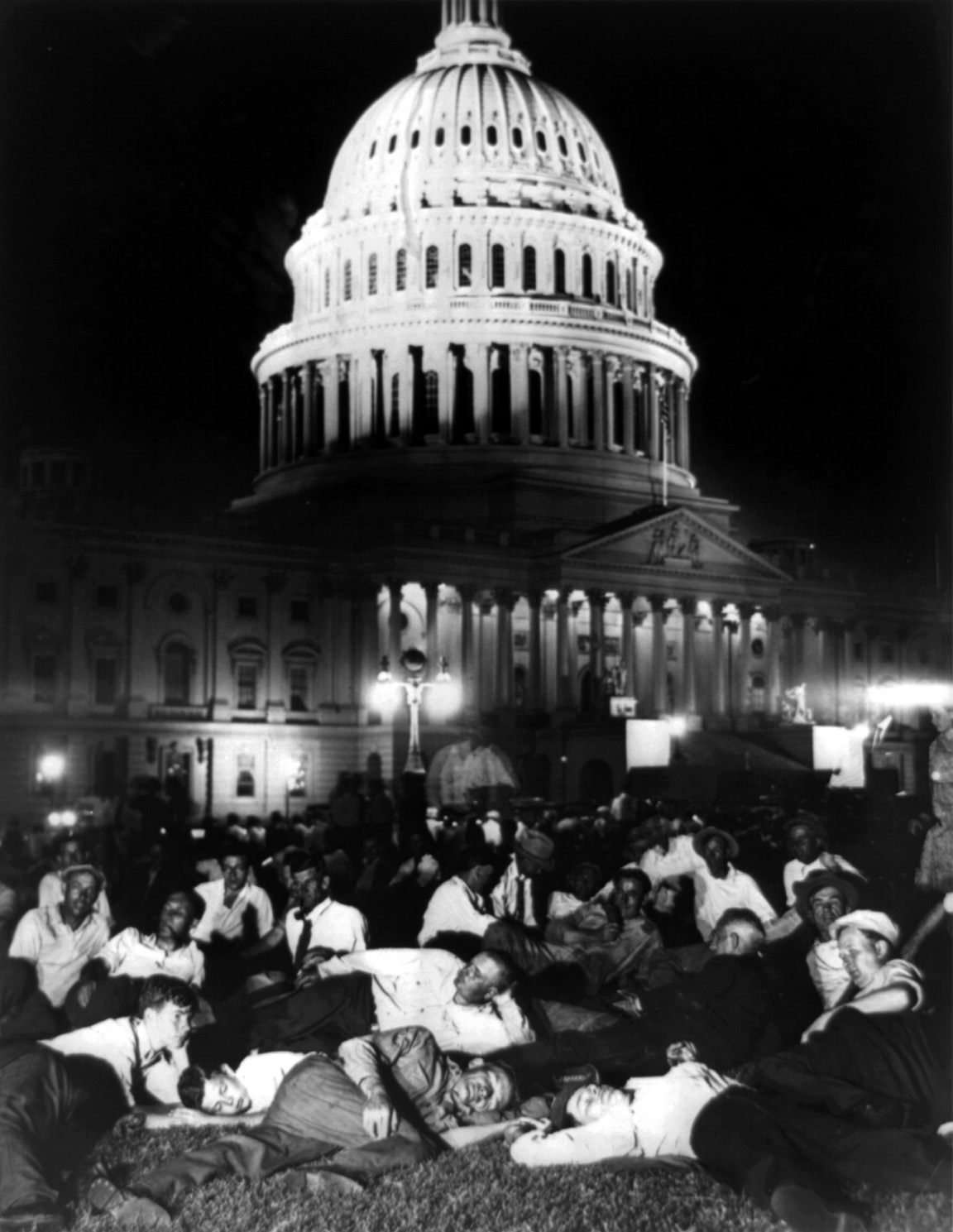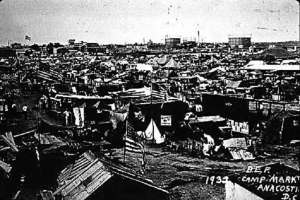
In 1924, a grateful Congress voted to give a bonus to World War I veterans - $1.25 for each day served overseas, $1.00 for each day served in the States. The catch was that payment would not be made until 1945.
However, by 1932 the nation had slipped into the dark days of the Depression and the unemployed veterans wanted their money immediately.
In May of that year, some 15,000 veterans, many unemployed and destitute, descended on Washington, D.C. to demand immediate payment of their bonus. They proclaimed themselves the Bonus Expeditionary Force but the public dubbed them the "Bonus Army." Raising ramshackle camps at various places around the city, they waited.

The veterans made their largest camp at Anacostia Flats across the river from the Capitol. Approximately 10,000 veterans, women and children lived in the shelters built from materials dragged out of a junk pile nearby - old lumber, packing boxes and scrap tin covered with roofs of thatched straw.
Discipline in the camp was good, Streets were laid out, latrines dug, and formations held daily. Newcomers were required to register and prove they were real veterans who had been honorably discharged.
June 17 was described by a local newspaper as "the tensest day in the capital since the war." The Senate was voting on the bill already passed by the House to immediately give the vets their bonus money. By dusk, 10,000 marchers crowded the Capitol grounds expectantly awaiting the outcome. Walter Waters, leader of the Bonus Expeditionary Force, appeared with bad news. The Senate had defeated the bill by a vote of 62 to 18. The crowd reacted with stunned silence.
A month later, on July 28, Attorney General Mitchell ordered the evacuation of the veterans from all government property, Entrusted with the job, the Washington police met with resistance, shots were fired and two marchers killed. Learning of the shooting at lunch, President Hoover ordered the army to clear out the veterans. Infantry Troops prepare to evacuate the Bonus Army July 28, 1932 and cavalry supported by six tanks were dispatched with Chief of Staff General Douglas MacArthur in command. Major Dwight D. Eisenhower served as his liaison with Washington police and Major George Patton led the cavalry.

By 4:45 P.M. the troops were massed on Pennsylvania Ave. below the Capitol. Thousands of Civil Service employees spilled out of work and lined the streets to watch. The veterans, assuming the military display was in their honor, cheered. Suddenly Patton's troopers turned and charged. "Shame, Shame" the spectators cried. Soldiers with fixed bayonets followed, hurling tear gas into the crowd.
By nightfall the BEF had retreated across the Anacostia River where Hoover ordered MacArthur to stop. Ignoring the command, the general led his infantry to the main camp. By early morning the 10,000 inhabitants were routed and the camp in flames. Two babies died and nearby hospitals overwhelmed with casualties. Eisenhower later wrote, "the whole scene was pitiful. The veterans were ragged, ill-fed, and felt themselves badly abused. To suddenly see the whole encampment going up in flames just added to the pity.
credit: http://www.eyewitnesstohistory.com/snprelief4.htm
Watch this brief video about the Bonus Army.
I'm not sure if I'm supposed to comment but I will anyway. I thought it was crazy that Persident Hoover just attacked the veterans instead of helping them! WWI was over partially because of them! It's crazy how self centered he was
ReplyDeletethats what i was thinking, after al that the veterans had done for our country, that is how he decides to treat them. he was so disrespectful and like u said self centered. i couldn't stand to live with a president who doesn't honor their service
DeleteIt must be terrible that the President treated the veterans with tear gas! How disrespectful to the people that helped the country during WWI.
ReplyDeleteWell, the President gave the orders....but I find it interesting that the other soldiers actually carried them out. The soldiers were actually 'fighting' veterans, which I find so disrespectful and sad! They could have decided not to, but who knows what could have happened if they did....
ReplyDeleteIt's a hard argument, but America was broke, and when people are desperate they do rash things.
Wow this really shows the effect money has on people like Kara said. The poor veterans had spent 2 years in gross trenches and harsh conditions to come back to debt and no way to feed their family without their money. It's so sad that this happened and it probably needed to.
ReplyDeleteWow this really shows the effect money has on people like Kara said. The poor veterans had spent 2 years in gross trenches and harsh conditions to come back to debt and no way to feed their family without their money. It's so sad that this happened and it probably needed to.
ReplyDeleteI don't think the veterans were appreiciated nearly enough for all they went though. They were tortured for over a year and then they come home to be stuggeling for money again. It does not seem fair!
ReplyDeleteIt's interesting how Hoover handled the problem a little poorly.
ReplyDelete